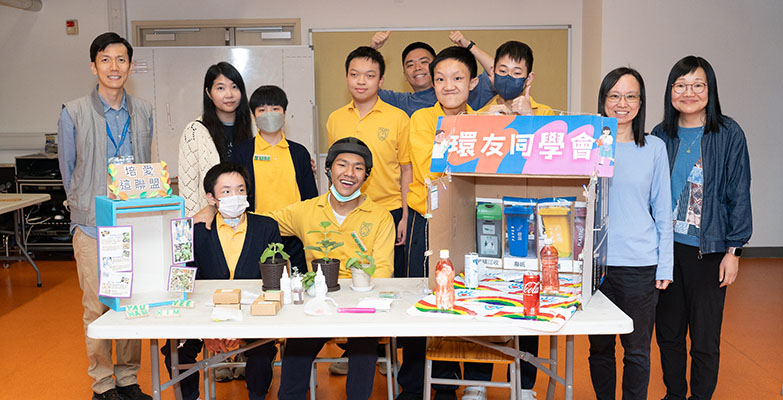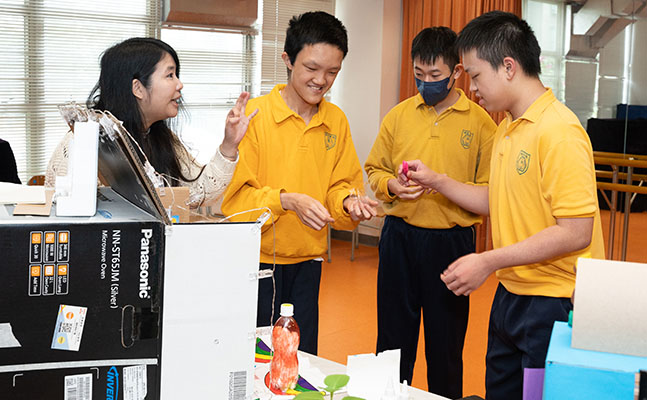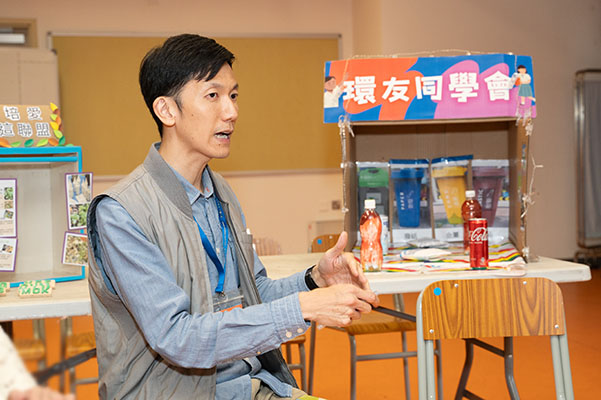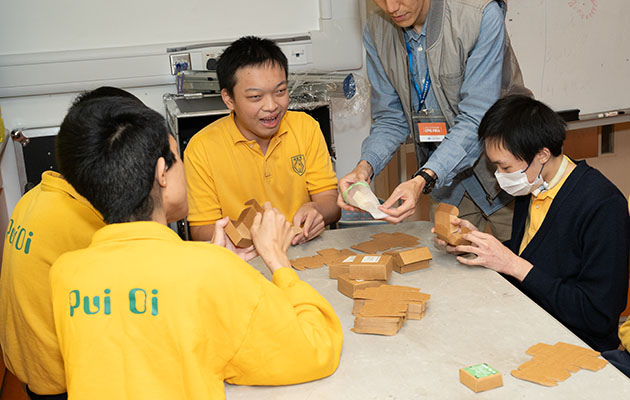Special Need Students 'Still' Have Hope: I Feel Valued !

A group of students from the 'Still Buddy Club' at Hong Kong Christian Service Pui Oi School spent their lunchtime preparing for 'The CLAP@JC Conference 2024', which was held on March 8th and 9th. They practiced promoting the green products of their brand 'Still'. Pang Chun-him, a Form 5 student with cerebral palsy, introduced how to make dishwashing soap with food waste in fluent English and expressed his hope that more people would know about their club. The brand name 'Still' has the same pronunciation as 'eco-buddy' (環友) in Cantonese. The group of students aims to connect with their neighbors by promoting sustainable development and working side by side.

Students were preparing for the booth at The CLAP@JC Conference 2024.
Environmental Protection and Life Development
The districts of Tuen Mun, Yuen Long, and Tin Shui Wai are significant for the development of the environmental industry. However, the industry has been facing a shortage of labor in recent years. 'So, we came up with the idea of designing a life development program with a theme of environment protection. The program aims to connect school and communities, encouraging students to expand their interests and equip them with green skills which may become a pathway in the future.' said Yat Sir, a social worker of CLAP@JC (Community Team).
The project follows the 'Youth Development and Intervention Framework' and encourages four types of participation namely 'Engagement', 'Self-Understanding', 'Career and Pathway Exploration' and 'Planning and Career Management'. The process of creating a brand can teach valuable skills to students, especially those with physical or intellectual disabilities, from hand-making to selling the products. For instance, when making soap with food waste oil, the mixing ratio of materials must be precise. Then, unmolding requires a certain amount of force, which can be challenging for those with upper limb disabilities, but they still try their best. Along with selling products and raising awareness about environmental issues, the students also gained valuable skills in communication and problem-solving.
Eco-buddy: 'I like myself more.'
During the interview, while the writer and Chun-him were chatting in the corner of the classroom, two classmates, Mok Ho-cheung and Wong Ho-kang, quietly approached and sat next to them. They were eager to share what they had gained from the Club. To their surprise, Ho-cheung said, 'I used to have social anxiety and was very timid, especially when meeting strangers.' Ho-kang nodded in agreement and said, 'So, we are excited about the prospect of speaking to people outside of school. We've never tried this before, and we're thrilled to be a part of it.' They all agreed that participating in the club has made a significant difference in their lives, and they have become more fond of themselves. 'I like participating in the activities of the Club and it feels like going to work.' Ho -cheung said with joy. When asked why he wanted to go to work, he replied that he wanted to experience a sense of competence and feel valuable. When asked if the Club was important to him, Ho-cheung replied firmly, 'It is not just important, but I like it so much!' His sincerity was evident from his straightforward speaking.
Telling Stories of Hope
Yat Sir encourages students to tell their stories through brand promotion and hopes they can understand the significance. According to him, 'Telling a story of hope can make society better.' He also shared that a student once quit the Club for a short period due to various pressures, 'So, we gave him space and encouraged him to participate gradually. Over time, he became more active and optimistic, inspiring classmates to adopt an eco-friendly lifestyle.' Yat Sir continued, 'These students need a sense of hope.'
'I hope everyone can get to know and support our Club at the Conference.' said Chun-him. Ho-cheung added, 'This coin toss game about recycling was designed by all of us together.' They emphasised that everything is a joint effort and demonstrate a strong sense of mutual responsibility and team spirit which is believed to be a kind of life education in youth development through raising awareness about environment protection.

Yat Sir hopes students can tell their stories through brand promotion and understand the meaning.
A Green Campus Promotes Life Education
The campus of Pui Oi School welcomes everyone with a green vibe that has a strong emphasis on environmentally friendly practices. One of the standout features of the campus is the green spine, which is lined with hydroponic equipment and surrounded by a variety of green spaces, including a rooftop garden, a landscaped garden, plant borders, and living walls. In addition to these eco-friendly facilities, the school is committed to promoting environmental education. For instance, the school participates in the "One Person, One Flower Scheme," where each class has students who act as gardeners, responsible for planting and harvesting their class garden. This program provides students with a hands-on understanding of the concept of 'life on life,' where they learn to appreciate the value of nurturing and caring for living things. Miss Lee, the supervisor of the life development team, shared, 'Students with different abilities take on different roles, some responsible for sowing while others are responsible for watering the plants. The happiest thing is when we get to share the harvest. Students who grew vegetables got to take them home, and some of them even made radish cakes with their homegrown radishes to share with their classmates during lunchtime. It's so much fun!'
School social worker Tse Chi-yan explained, 'At the beginning, students did not quite understand the importance of protecting the environment, but through group activities and talks, they gradually learn that something we consider unwanted may not be rubbish. If we put it in the right place, it can turn into treasure.' This applies to people as well. Teaching is like tending a garden. In schools, recycle bins are placed in each classroom, and teachers will take the students to bring the recyclables to the recycling stores in the territory. 'They have long been familiar with the Green$ Electronic Participation Scheme.' Tse said. She added that during a recent field trip where they cooked food over an open fire, the students even brought their homemade dishwashing soap.
Disabled students are often viewed as a group that needs protection, 'but we do believe that they can fulfill their civic obligations just like everyone else. The only thing that stops them from participating is the lack of trust and support from adults.' Therefore, the key to enabling their participation is to become a trusted adult for young people with disabilities.
Currently, Young members from the Club compost food waste to regenerate the soil. Chun-him shared, 'Being a part of the Club gives me a great sense of accomplishment. And I find the process of turning waste into energy and contributing to the earth valuable. It is the highest satisfaction.' It is believed that in a good learning environment, limitations can be transformed into abilities. "I hope to do meaningful things within my capabilities." He said.
'Still', signifies hope and endless possibilities. This is their brand's story.

Students are packing their product.








